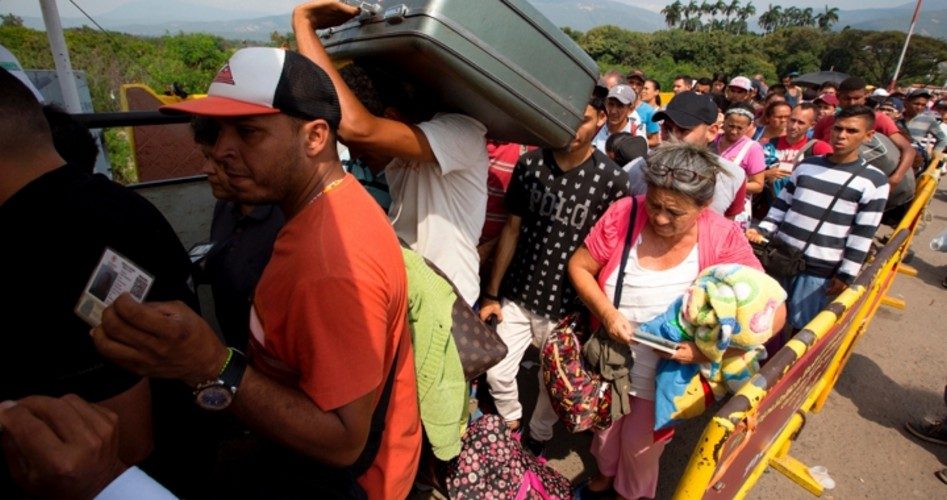
Thousands of Venezuelans are fleeing unbearable conditions under the country’s Marxist dictator Nicolás Maduro every day, seeking temporary refuge in other Latin American countries. However, most of them go to neighboring Colombia, especially the border city of Cúcuta, located just across the Simón Bolívar International Bridge.
The Los Angeles Times reported that an average of 35,000 people cross that bridge every day, and about half of them return to Venezuela after making purchases, conducting business, or visiting family. But the other half stay in Cúcuta, with some moving on to the Colombian interior or to other countries.
The Times report observed that many Venezuelans who cross the border at the bridge stop at the Divine Providence Cafeteria, an open-air soup kitchen operated by a Roman Catholic priest, Father Leonardo Mendoza. The priest and his volunteer staff serve about 1,500 meals daily to refugees from Venezuela.
As happens in other places where a flood of refugees settle in one place, services in Cúcuta, a city of 650,000, are taxed to the limit. The emergency room at one large hospital, which was built to accommodate 75 patients, is often crowded with 125 or more.
Though the government and people of Colombia have been generous in helping arriving Venezuelans, there is a limit to how much they can do, so some refugees must be sent back home.
“We can’t tell everyone, ‘Come, stay here,’” Christian Kruger, the director of Colombia’s migration agency, said in a recent interview quoted by AP. “There is no country in the world that can support unlimited migration.”
The AP report notes that hundreds of thousands of migrants have left Venezuela in the first three months of this year. Colombia has received the bulk of those, with an estimated 3,000 Venezuelans arriving there each day. That is about as many migrants every two months as Italy took in all of 2016 during the more high-profile Mediterranean migration crisis.
A special migration unit launched by President Juan Manuel Santos in February conducts twice-daily roundups in the nation’s busiest border cities. According to Kruger, Venezuelans caught without papers are given the option of paying a fine far higher than what most will earn in a year, contesting the fine in court, or going back to Venezuela.
Given that choice, said Kruger, most ask to be sent back.
Colombia faces the same situation that the United States does, however, with deported migrants often coming back across the border multiple times.
Photo of Venezuelans crossing the Simón Bolívar International Bridge into Colombia: AP Images
Related articles:
Pence Wants Venezuela to Cancel Scheduled Election and Get Out of OAS
Creditors Gathering to Plan Seizures Following Venezuela’s Defaults
Starvation, Suicides Increasing Under Venezuela’s Hyperinflation
Nearly 3,000 Venezuelans Leaving Their Country Every Day
Venezuela’s Crude Oil Exports to U.S. Declining Sharply
Venezuela Pushes Presidential Election Forward With Maduro the Only Candidate



